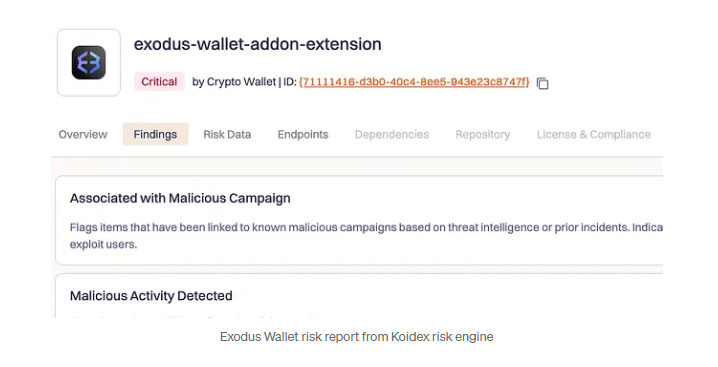A band of digital desperados, known in certain circles as “GreedyBear,” have been caught red-handed (or perhaps, pawed) in a heist of epic proportions, siphoning off a cool million through what experts are calling a crypto caper of unparalleled audacity.
Koi Security, a firm with a penchant for unearthing the murkiest of cyber schemes, has unveiled the intricate web spun by this group, a tapestry of deceit woven from malicious browser extensions, malware, and a smattering of scam websites, all orchestrated from a shadowy lair.
Extensions Transformed into Thieving Thugs
Far from content with a single arrow in their quiver, GreedyBear has diversified its arsenal, deploying a staggering 650 nefarious tools in its latest escapade, a significant leap from the modest 40 Firefox extensions it paraded in July under the guise of “Foxy Wallet.”
“The group’s strategy, dubbed ‘Extension Hollowing,’ begins with the seemingly innocent publication of benign Firefox add-ons-your run-of-the-mill video downloaders and link cleaners,” elucidates Koi Security’s own Tuval Admoni, with a twinkle of both admiration and horror. “These extensions, birthed from freshly minted publisher accounts, gather a chorus of fake positive reviews, lulling the unwary into a false sense of security. Only then do they morph into malevolent doppelgängers of wallets like MetaMask, TronLink, Exodus, and Rabby Wallet, ready to pilfer and plunder.”

Once ensnared, the unsuspecting user finds their credentials whisked away to GreedyBear’s command-and-control servers, a digital vault of ill-gotten gains.

Malware Lurking in the Shadows of Pirated Software
The digital detective work doesn’t end there. Nearly 500 malicious Windows files have been traced back to the same miscreants, a rogues’ gallery of well-known malware families such as LummaStealer, a ransomware variant reminiscent of Luca Stealer, and trojans that serve as gateways to further mischief.
Their distribution channels are as cunning as they are ubiquitous, often found lurking on Russian-language sites that peddle cracked or “repacked” software. By targeting those who seek the free lunch of illicit software, GreedyBear casts a net far wider than the crypto community alone.
Adding a layer of sophistication, Koi Security uncovered modular malware, allowing the operators to tweak and tailor their attacks without the need for a complete overhaul of their digital arsenal.

Fake Crypto Services: The Art of Deception
But why stop at browser extensions and malware when one can craft an entire universe of fraudulent websites? GreedyBear, ever the connoisseur of deceit, has erected a veritable city of scams, each posing as a legitimate cryptocurrency solution.
From counterfeit hardware wallets to sham wallet repair services for devices like Trezor, the group’s offerings are as varied as they are perilous. Even the most discerning eye might be fooled by the polished designs of these fake wallet apps, which coax users into divulging their recovery phrases, private keys, and payment information.
Unlike the garden-variety phishing site that mimics exchange login pages, these scam portals masquerade as product or support hubs, adding a veneer of legitimacy to their nefarious activities.
Reports indicate that many of these sites remain active, a digital minefield still primed to harvest sensitive data, while others lie dormant, awaiting the call to action.
Almost all domains linked to these operations converge on a single IP address-185.208.156.66-a digital nerve center where stolen credentials are processed, ransomware is orchestrated, and scam sites are hosted, a testament to the meticulous planning and execution of GreedyBear’s grand scheme.
Read More
- Clash Royale Best Boss Bandit Champion decks
- Vampire’s Fall 2 redeem codes and how to use them (June 2025)
- World Eternal Online promo codes and how to use them (September 2025)
- Best Arena 9 Decks in Clast Royale
- How to find the Roaming Oak Tree in Heartopia
- Mobile Legends January 2026 Leaks: Upcoming new skins, heroes, events and more
- Solo Leveling Season 3 release date and details: “It may continue or it may not. Personally, I really hope that it does.”
- ATHENA: Blood Twins Hero Tier List
- How To Watch Tell Me Lies Season 3 Online And Stream The Hit Hulu Drama From Anywhere
- Sunday City: Life RolePlay redeem codes and how to use them (November 2025)
2025-08-10 16:54